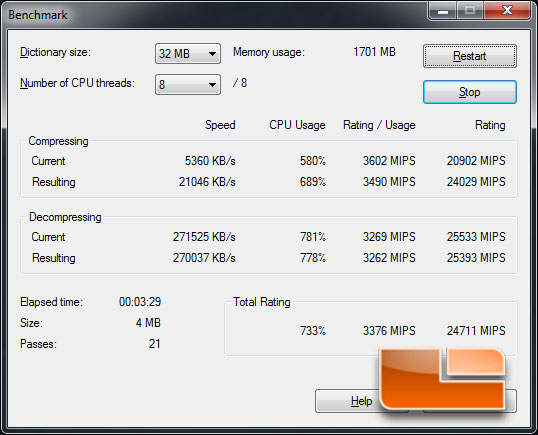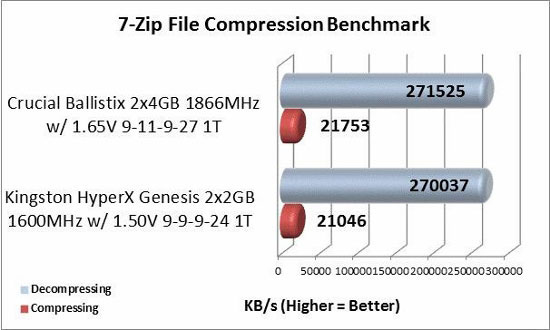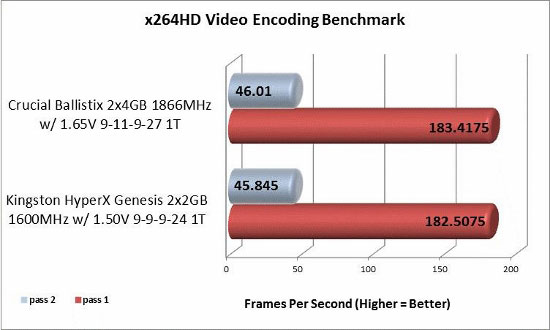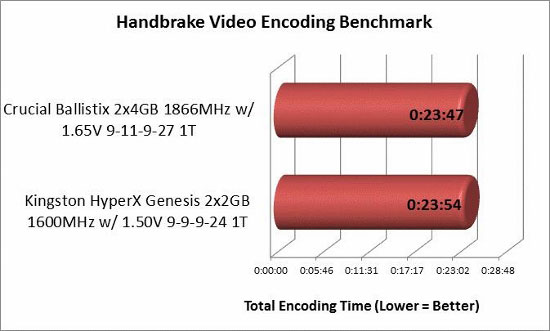Crucial Ballistix 8GB DDR3 2000MHz CL9 Memory Kit Review
File compression, media encoding
Now that the synthetic benchmarks have established that the Ballistix can outperform a relatively standard 1600MHz kit of RAM, we will examine some real world applications to see if a buyer will be able to detect a performance difference during normal use.
7-Zip
Our first real world test will use the free 7-Zip. 7-Zip is a file archiving application that can compress and decompress many file formats including zip, rar, and 7z files. We chose to test 7-zip because of its ability to take advantage of modern hardware such as multi-threaded CPUs and advanced instruction sets like AES. For our 7-zip Compression and Decompression Benchmark we use the benchmark utility built in to 7-zip version 9.20. We run at least 10 passes using a 32MB dictionary size. With these settings, 7-zip reports using approximately 1700MB (1.7GB) of system RAM. Task manager reports the 7-zip executable, 7zG.exe, fluctuates between 128MB and 1,641MB of RAM. This benchmark is multi-threaded, reporting anywhere from 5 to 8 CPU cores being used at any time on our Intel Core i7 2600K test system. To measure results, we observe the raw compression and decompression speeds as reported by the benchmark.


Our BallistiX are definitely faster than the baseline kit while compressing and decompressing data, but not significantly. The real-world speed gain from faster memory in this test is between 0 and 4 percent.
Media Encoding: x264
To measure media encoding performance we will be using the excellent x264 benchmark developed by graysky and updated by Adrian Wong & Dashken and can be found here: http://www.techarp.com/showarticle.aspx?artno=520. X264 is a free video encoding library that is very popular among video enthusiasts for its ability to produce high quality videos while maintaining reasonably small file sizes. The x264 benchmark has been updated to version 4.0 and now includes an HD test clip. Video encoding processes are some of the most intense tasks a modern computer will complete, and they tend to be very sensitive to CPU core counts and memory bandwidth. The test repeats a 2-pass encode of a 720p MPEG2 source into a MPEG4 video file four times. The results of the test are reported in frames per second and here we present the average of the four benchmark runs.

Like 7-Zip, the x264 test did not demonstrate remarkable speed gains from the faster memory bandwidth, with speed improvements being less than one percent.
Media Encoding: Handbrake
We are also using the very popular Handbrake application to test encoding performance. Our Handbrake test involves converting an 8.37GB raw blu ray source file down to approximately 2.3GB, a size which is more suitable for long term storage. The test file is a 38 minute clip from the X-Men: First Class blu ray. The test maintains the original 1920 pixel width from the source 1080p file but cuts off the black borders normally associated with wide aspect ratios, reduces the video bitrate, and also downmixes the original DTS 6 channel audio track to a 2 channel 160kbps Dolby Pro Logic II track.

In what is becoming a theme, the results again show a speed improvement of less than one percent when compared to 1600MHz DDR3 at Cas 9.

Comments are closed.